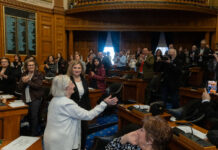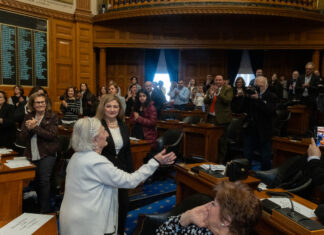WATERTOWN, Mass. — On Thursday, May 27, teachers from all corners of the globe graduated from the Perkins International Educational Leadership Program (ELP) in the chapel of the historic Howe Building at Perkins School for the Blind.
Thirteen ELP participants arrived at Perkins in September to study teaching methods and bolster their skills with the goal of improving programs for students who are blind or deaf and blind, including those with multiple disabilities.
Four ELP graduates had returned to their home countries in February.
Anna Tahmazyan has worked at the Gumri Children’s Home since 2004 while at the same time, pursuing her education. Her responsibilities include working as a psychologist as well as providing individual training for children who are blind with additional disabilities. She has a psychologist license from Gumri Pedagogical Institute. While at Perkins, Tahmazyan gained knowledge, skills and experience in working with preschool-age children and children who are deaf and
blind. When she returns to Armenia during the summer, Tahmazyan will improve education for children who are blind with multiple disabilities at a new educational center that the principal of the Children’s Home plans to open.
Educators from other nations have come to Perkins to study since the 1920s. The Educational Leadership Program is a critical element of Perkins International’s mission to strengthen the skills of teachers of children who are visually impaired with other disabilities around the world. With a grant from the Conrad N. Hilton Foundation, the ELP expanded in 1989. Nearly 200 educators from 70 countries have completed the program. Many have become leaders in visual impairment and multiple disability education, including work with families.
Nuclear physicist, science media producer and author Dr. Aziza Baccouche addressed the group. The title of her in-progress film, “Seeking Vision,” is the theme of her talk, urging the teachers to keep working to break down barriers for their students.
Baccouche lost her vision at age 8. Persistent and gifted, she became one of a handful of blind people to gain a PhD in nuclear physics. At CNN and PBS she was the first blind on-air correspondent and produced science news segments.
With her own media production company, she expects to launch a public TV science show. Baccouche seeks to change attitudes and perceptions about the abilities of people who are blind. She stays in close touch with teachers at the Tunisian schools for the blind she attended as a child.








